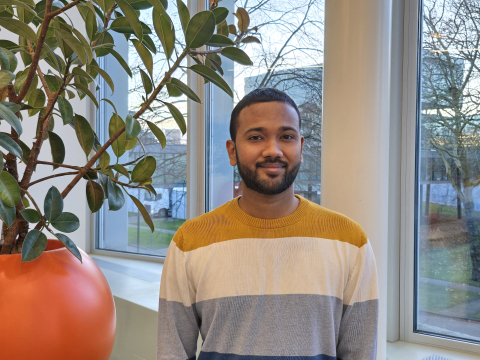DIFFER researcher Hari Varadarajan receives a 2025 EUROfusion Engineering Grant (EEG). This award is given to outstanding early-stage engineers, working on key technological challenges essential to the European fusion programme. Varadarajan wins this prestigious award for his project ‘Cooperative control for fusion’.
Plasma in a tokamak is rotating, it has some movement when it’s going around in the donut shaped fusion plant. To ensure the hot plasma isn’t too hot when it reaches the wall of the fusion plant, it needs to be cooled down. This is planned to be achieved by puffing impurity gases near the divertor wall. However, the plasma may not get too cold, because then it might suddenly stop. “When this plasma disruption takes place, it causes heavy changes in the electrical and magnetic field”, explains Varadarajan.

“Such heavy changes cause heavy forces on the supporting structure, so it is important to make sure the impurities do not go into the plasma core. The movement of the impurities is governed by the density and temperature gradients, which will be affected by the fueling pellets. My goal is to ensure that the fueling and heating actuators talk to each other, to enable coordination between them to avoid impurities going into the core. That’s what I will focus on from January 2025.”
DIFFER director Marco de Baar: "Torben Beernaert described the plasma as a system of seven, mutually interfaced, functional blocks. Varadarajan will now apply this insight to synthesize model-based controllers that coordinate between the blocks and interfaces with the view to achieve global optimal behaviour." At DIFFER Varadarajan will be joining the Energy Systems and Control team of Matthijs van Berkel, one of the leading groups in the world when it comes to the control of fusion plasmas.
Journey to fusion
In June 2022, Varadarajan ended his Master Energy Systems and Engineering in India. During his master, in the summer of 2021 he stayed in France for a three-month engineering internship at ITER. It was his first introduction to fusion: “During my internship, I worked on a fusion related project. It was very inspiring. From then I knew: I want to do more in fusion.” Currently Varadarajan works on distributed control methods for energy systems at TU/e, together with dr. Dinesh Krishnamoorthy. “After talking to Marco de Baar I was more devoted to apply the control methods that I’ve developed to fusion devices. This made me apply for the EEG.”
Fascination
Energy sources have always been a fascination to Varadarajan, since he was a child. “It’s the whole ‘holy grail’ idea. That impression failed a little bit seeing all the technical details, but it’s good we all work towards it. To make fusion happen on a bigger scale, that’s a big challenge.” In this exciting process Varadarajan prefers working with the machines, to understand how we actually do it: “Although physics is interesting, I feel more like an engineer in that sense. I want to know how actuators work and how we can control the process.”
Varadarajan realized he needed to understand the physics to make the next step: ”I don’t have a physics background, which initially made me feel quite uncertain. I decided to attend courses, like free online EPFL courses and a Carolus Magnus summer school in Brussels. That helped me fill a lot of these gaps. Now I feel much more confident to speak with other fusion PhD’s at DIFFER, which is a great club and always helping each other.”
Settling down in The Netherlands
Varadarajan started working in the Netherlands during winter. For someone who has been raised in India, where the sun always sets on the same time, he needed to acclimate for a while. “I know it’s typical, but that weather… Now I understand the saying ‘I am not made from sugar’. When I first came here, I started to feel sleepy at five o’clock. This winter I prepared myself thoroughly by installing extra lighting in my house. Even then I prefer to stay in the DIFFER office until six or seven o’clock, a brightly illuminated place. And also because (I must admit) the amazing coffee DIFFER offers.”
Talents in fusion
The EEG is supposed to bring more talented people into fusion. Varadarajan: “It is a very nice opportunity to make a career in fusion, to explore new opportunities and to get people connected to the field.” Mostly postdocs receive an EEG, but Varadarajan is a post master researcher. “I can make these steps now, thanks to people who triggered and inspired me, for instance EUROfusion’s training and education officer Eva Belonohy. It would also not have been possible without the help of Marco the Baar. He is such an enabler”, says Varadarajan.
Varadarajan does not lack optimism: “Realizing fusion feels almost like a universal goal, like landing on the moon. The first fusion reactor will be a huge technological advancement of the human species. A lot of people are working on it, I’m really hopeful. I don’t think it will be too far away, and I want to witness it.”
Read more about the research activities of the Energy Systems and Control group at DIFFER.
Author: Rianne van Hoek
Go to the News page.